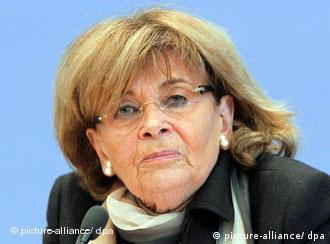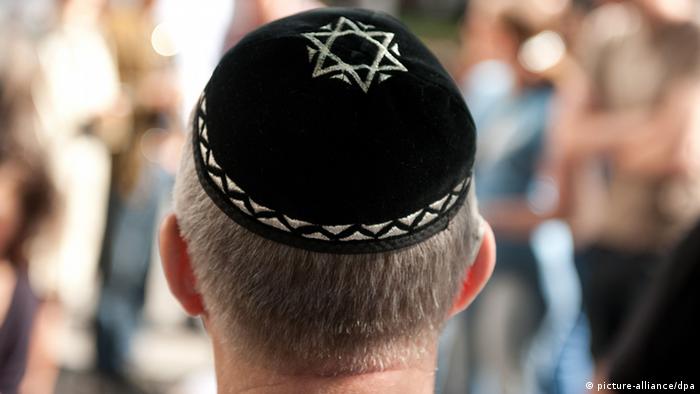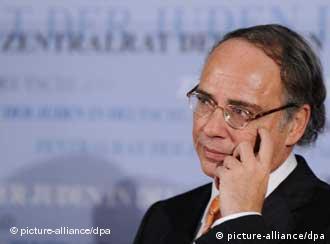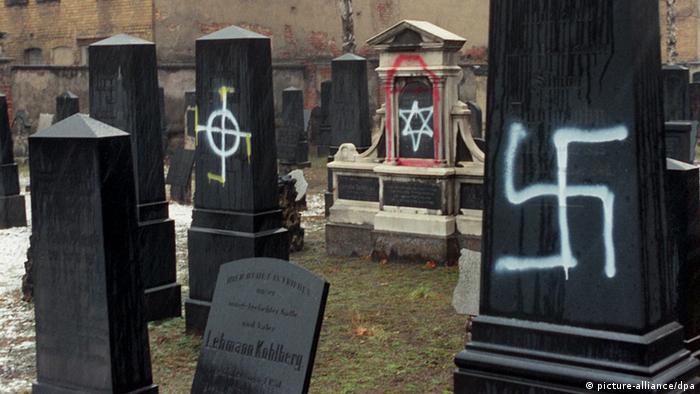Gaza conflict fuels anti-Semitism debate in Germany
Gaza conflict fuels anti-Semitism debate in Germany
The Gaza conflict between Israelis and Palestinians has led to a heated debate in Germany. After anti-Israel demonstrations, Jewish organizations are speaking out, saying "the old hatred of Jews" was back in Germany.
"The old hatred of Jews – it's here again," said Charlotte Knobloch, adding that the Middle East conflict is currently just a pretext for many to vent their anger against Jews. Knobloch is the President of the Jewish community of Munich and the Upper Bavaria region. The 82-year-old survived the holocaust, and says she is shocked about the open anti-Semitic slogans shouted in German streets and about the fact that the German population has been keeping silent. Anti-Semitism is no longer just socially acceptable in Germany, it's becoming "mainstream", Knobloch is convinced. That's why she and hundreds of celebrities from the fields of politics, religious life and civil society took to the street in Munich this week – in a rally against anti-Semitism.

Knobloch is shocked about open expressions of hatred of Jews
Her telephones keep ringing, letter boxes and e-mail inboxes are full, Knobloch said: "People curse at us, they insult us, they threaten us and physically attack us." The former President of Germany's Central Council of Jews adds: "we Jews are currently experiencing the most menacing and sorrowful time since 1945." She says she is particularly worried about the lack of support by Germans for their Jewish fellow citizens. Germany's minister of agriculture, Christian Schmidt (CSU), called anti-Jewish slogans a "virus undermining our common homeland." Barbara Stamm, the president of the Bavarian regional parliament said: "Anti-Semitic slogans are a disgrace for our country."
"Sympathy with Palestine as a weapon against Israel"
The conflict between Israel and Palestine is an "open wound" for Berit Kessler, a Protestant regional bishop. The war in the Middle East is a "welcome opportunity for many to give free rein to their anti-Jewish resentments," she said. Israel's right to exist must not be questioned. She says sympathy with Palestine is used as a weapon to justify harm done to Israel. "That's perversion of honest solidarity," she stressed.

Germany's interior ministry denies claims that the number of assaults on Jewish institutions has risen
In the western German town of Wuppertal, meanwhile, three men committed an arson attack on the local synagogue this week. They threw several Molotov cocktails into the reception area. One suspect was arrested. That same evening, several hundreds of people participated in a rally outside the synagogue. Peter Jung, the mayor of Wuppertal, called for solidarity with the Jewish community. Dieter Graumann, the President of the German Central Council of Jews, condemned the attack, as did Germany's Central Council of Muslims, which has also registered several attacks on mosques lately.
Since the armed conflict broke out again between Israel and the radical Islamists of Hamas in the Gaza Strip, the Protestant German news agency Evangelischer Pressedienst (epd) claims to have observed "an increase of attacks on Jewish institutions and cemeteries." The Central Council of Jews in Germany won't comment on those claims. But it points to the Berlin-based Amadeu Antonio foundation, which has been documenting such cases on its website since 2001 – based on victims' accounts and on newspaper articles.
Their ‘chronicle of anti-Semitic incidents 2014' lists 98 cases since January. Among them: the cases of somebody urinating on Berlin's memorial for murdered Jews, as well as an allegedly anti-Jewish caricature in German newspaper Süddeutsche Zeitung; tombstones thrown over on Jewish cemeteries, and anti-Jewish graffiti on public buildings. "We have been registering an increase in such assaults," confirmed Anetta Kahane, the chairwoman of the Amadeu-Antonio foundation, in an interview with DW.
Official figures don't back claims
But according to the German interior ministry, the number of criminal offences with an anti-Semitic background has declined considerably over the last decade. In the period between 2001 and 2013, the number of criminal offences dropped from 1,691 to 1,275 – by roughly one quarter. At the same time, over the same period, the number of acts of violence with an anti-Semitic background almost doubled to 51 cases in 2013. That includes cases of homicide, arson attacks, blackmail, robbery and sexual assaults. "Unfortunately we can't comment on developments over the last few weeks," a spokesperson of the interior ministry told Deutsche Welle.

Graumann joined protests against an arson attack on a synagogue
Berlin-based linguistics professor Monika Schwarz-Friesel says she has noticed an "explosion of verbal anti-Semitism expressed online. In times of crisis in the Middle East, there have "regularly been waves and floods" of anti-Semitic statements expressed in social networks and on websites. "But what's happening at the moment is exceeding everything we have seen in the last few years – both quantitatively and qualitatively," the researcher told Deutsche Welle.
Many such comments are conspiracy theories about an alleged diktat of opinion, which allegedly bans all criticism of Israel in the public debate. The researcher, who has just started a research project on "anti-Semitism on the Internet," says that comparing Israel's policies with Nazi crimes is not legitimate political criticism. "Instead, what you see is the surfacing of a deeply rooted resentment of Jews.” dw de

Comments